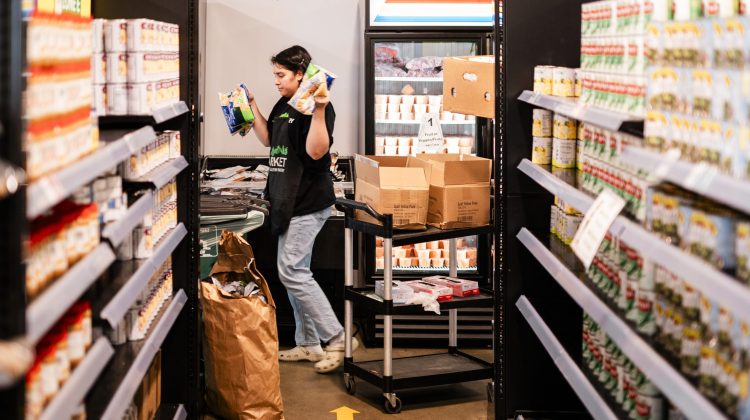As the federal government shutdown stretches into its fourth week, uncertainty looms over food assistance for millions of Americans.
The U.S. Department of Agriculture warned state SNAP directors earlier this month that if the shutdown continues, there may not be sufficient funding to pay full Supplemental Nutrition Assistance Program (SNAP) benefits — also known as food stamps — on Nov. 1.
SNAP serves nearly 42 million Americans each month, allocating funds to states on a rolling basis. Benefits for October were distributed before the shutdown began on Oct. 1, allowing households to access their usual aid.
But with the Nov. 1 allocation in jeopardy, local organizations on the North Shore are preparing for what could be a surge in need.
Gov. Maura Healey said during a briefing on Friday at Nubian Markets in Roxbury, “President Trump has chosen to take away food from people all around this country.”
She continued, “That’s going to mean that one million people in Massachusetts are not going to have their food benefits starting next week.”
Between 2017 and 2021, about 15% of Essex County households received SNAP benefits — higher than both the state (12%) and national (11%) averages. In Lynn, the rate was even higher, with 26% of households relying on food assistance, according to Impact Essex County.
For these families, even a short disruption could mean empty pantries and difficult choices between groceries and other essentials.
Director of Communications, Marketing & Public Relations, Heather MacFarlane of the Massachusetts division of The Salvation Army said, “As the nation’s largest nongovernmental provider of social services, we will do everything within our capacity to love and serve families and individuals in need.”
She added, “Significant changes in either could impact our ability to serve nearly 28 million people in the U.S. who seek access to food, shelter, or other necessities each year.”
MacFarlane added that across the country, The Salvation Army has seen needs shift and increase over the last few years, and anticipates that demand will continue to increase through the end of 2025 and into 2026.
“Locally, we have an emergency food pantry that receives limited to no government funding, and we provide critical social services. In the upcoming months, we are preparing to help those who need heating assistance, warm winter coats, and seasonal assistance,” she said.
The Salvation Army’s capacity to provide services at our nearly 7,400 centers of operation across the U.S. relies heavily on the generosity of the American public and the support of government funds.
“We encourage anyone who is able to support The Salvation Army and our fellow community nonprofit partners to do so, helping ensure we can continue providing life-changing services to our neighbors in need. Please visit salvationarmyma.org/lynn for more information about our work,” she added.
At food pantries across the North Shore, leaders say they are monitoring the situation closely and readying themselves as best they can — despite already strained resources.
“This is always our busiest time of year,” said Kia Fernandez, marketing and communications manager at The Salem Food Pantry. “We’re expecting even more of a need this year, so we’re definitely bracing for it.”
Fernandez said the organization is urging residents to stay current on their SNAP paperwork in case the issue is resolved quickly. “We’re advising people to continue to apply and make sure their accounts are in check,” she said. “Resources have been really thin this year, but with community support, we’re doing everything we can to help everyone through the holiday season.”
The Salem Pantry operates both a storefront in downtown Salem and mobile pop-up pantries across the North Shore — including in Lynn, Swampscott, and Beverly — to meet families where they are. Fernandez said monetary donations are the most effective way for residents to help, as they allow the pantry to purchase food in bulk and fill critical gaps quickly.
Smaller pantries, including those in Marblehead and Swampscott, may have less flexibility but are nonetheless coordinating with larger partners. The Anchor Pantry in Swampscott and Catholic Charities’ Phoenix Food Hub in Lynn are among the local organizations preparing to support families in the event of benefit delays.
Suzanne Hale, Board President of SPUR, a local nonprofit, said a lot of the changes “that have or were going to happen already happened when the initial funding for USDA happened early on in the change of administration.”
Hale, who is also a board member of Anchor Food Pantry in Swampscott, said the pantry buys in bulk from the Boston Food Bank, so any monetary donations will go the longest way for people in need.
She added that this weekend, she has coordinated a community service event called Trick or Treat So Others Can Eat, where Girl Scout troops go into Swampscott neighborhoods, wear their Halloween costumes, and collect donations for a list of Thanksgiving items needed for the Thanksgiving meals at the Anchor Food Pantry.
Sunday, from 3 to 4 pm, all of the Girl Scouts in Swampscott will meet at the Swampscott Senior Center and will bring all of the donations to sort them, pull anything that’s expired out of the collection, and then bring it all to the Anchor Food Pantry.
Hale said, “If you come by the senior center between three and 4 pm on Sunday with your donation, we can bring that to the food pantry for you.”





